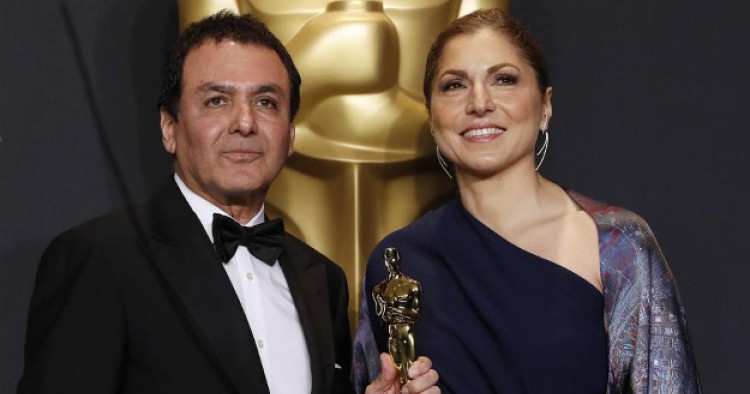While the Iranian hardline media largely ignored the Oscar victory by the country’s world-renowned director Asghar Farhadi, Foreign Minister Javad Zarif hailed Farhadi’s accomplishment and used the occasion to attack the Trump administration’s plan to temporarily ban immigration from seven Muslim-majority nations, including Iran. “Proud of cast & crew of "The Salesman" for Oscar & stance against #MuslimBan. Iranians have represented culture & civilization for millennia,” Iran’s top diplomat tweeted. Farhadi, who won his second Oscar reward for his drama “The Salesman,” boycotted the ceremony to protest President Donald Trump’s immigration policies.
Comment: While Zarif used Farhadi’s historic Oscar victory as an opportunity to attack Washington’s immigration policies, he did not utter a word about scores of Iranian filmmakers and artists who are languishing in Iranian jails after unfair trials. On January 23, regime plainclothes agents arrested female journalist Zeniab Karimian and young filmmaker Saleh Deldam, and their families have yet to hear about their fate. In December, Mehdi Rajabian, an Iranian musician serving a three-year jail term at Tehran’s Evin prison, was being treated for internal bleeding at a hospital when the country’s Judiciary demanded that he return to prison, disregarding his serious medical condition. A Revolutionary Court in 2015 found Rajabian, his filmmaker brother Hossein Rajabian, and their musician friend Yousel Emadi guilty of “insulting Islamic sanctities” and “illegal audio-visual activities.”
Indeed, the Iranian regime has intensified its crackdown on journalists and artists in recent years. In an open letter last year, 165 Iranian artists and activists condemned the increasing acts of repression against artists by the authorities. They claimed that artists were “subjected to harsher days than in the past” because of “detentions and heavy sentences and restrictions on their activity.” The letter added that the authorities tortured many artists and forced them to make confessions on television. “We see heavier punishments for artists than for criminals,” they complained. But such condemnations and pleas for fair trial fall on deaf ears as the authorities continue to silence voices of critics, including artists whose works the regime sees as threatening to its principles and survival.
The Middle East Institute (MEI) is an independent, non-partisan, non-for-profit, educational organization. It does not engage in advocacy and its scholars’ opinions are their own. MEI welcomes financial donations, but retains sole editorial control over its work and its publications reflect only the authors’ views. For a listing of MEI donors, please click here.













